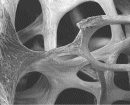
| Home | |
Investigators |
|
 |
|
|
|
||||||||||
Paget's DiseasePaget's Disease is a condition where the remodelling of bones is abnormal, resulting in deformity, pain and fragile bones. Normal bone is a living tissue which is constantly altered throughout life - the bone is broken down by one type of cell (osteoclasts) and then built up again by another (osteoblasts). In Paget's Disease this remodelling process is accelerated and newly formed bone has less time to become structurally organized, and is therefore weaker. Paget's Disease is a condition which usually affects people over the age of 50, and is slightly more common in men than in women. It is particularly common in the UK and Australia but the incidence world wide is not known. The cause is still uncertain but includes having a genetic predisposition. Another event, perhaps later in life, may then start off the disease. What are the symptoms? Paget's Disease can affect any bone but it is most common in the skull, pelvis and leg bones. The bones may become deformed, for example the long bones may become bowed or the skull may become larger. Because the bone structure is abnormal the bones may be painful and are more likely to fracture. How can Paget's Disease be diagnosed? Instead of new bone being laid down in neat parallel rows, in Paget’s disease it has a disorganized structure and this can easily be seen on X-Rays of the affected bones.
How is it treated? The management of this condition has been revolutionized by the introduction of bisphosphonates. These drugs inhibit the activity the osteoclasts. Currently in the UK the two bisphosphonates in clinical use are oral risedronate and intravenous pamidronate or zoledronate. Risedronate is given over a two month period and needs to be taken fasting because bisphosphonates are badly absorbed from the gut. For those patients in whom there is a problem with oral treatment
(the bisphosphonates as a group may cause heartburn or indigestion)
the drugs can be given as an intravenous infusion. While oral
treatment can be given by your General Practitioner, the intravenous
infusion needs a hospital out-patient visit. Questions patients ask Why is my affected bone painful? Will my Paget’s disease spread from one bone to another? More information National Association for the Relief of Paget's Disease
|
||||||||||
| Text only | Accessibility | Search | Contact |